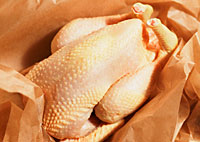Abattoir fined in Food Safety Week | Food Safety Lawyer

This week is food safety week ( May 18 – 24) as the Food Standards Agency focus on reducing the number of food poisoning cases from campylobacter. It coincides with the recent prosecution of a Turkey Abattoir from Braintree, Essex, who were fined for killing birds without a vet present
Last year in the UK, there were 280,000 cases of campylobacter food poisoning and 100 deaths (according to the FSA). Campylobacter poisoning usually develops a few days after eating contaminated food and leads to symptoms that include abdominal pain, severe diarrhoea and, sometimes, vomiting.
One of the main themes of Food Safety Week is the campaign to stop people washing chickens. The call comes as new figures show that 44% of people always wash chicken before cooking it Рa practice that can spread campylobacter bacteria onto hands, work surfaces, clothing and cooking equipment through the splashing of water droplets.
This campagin coincides with a recent prosecution of GST Ltd, of Parsonage Farm, Shalford, which was successfully prosecuted after a Food Standards Agency (FSA) inspector visited by chance on 9 October last year. √جª¬øThe Company was fined £3,500 and ordered to pay costs totalling £2,100 for killing birds without an official vet present.
The FSA said this meant official ante-mortem and post-mortem inspections were not carried out “on a number of slaughtered turkeys”.
The authour recently represented an Ostrich Farmer who faced legal proceedings from Wakefield City Council, who wanted the Council to refuse to renew his licence under Dangerous Wild Animals Act 1974. One of the complaints was that there was no vet present when Ostriches were put down from time to time. On 6th February 2015, the Regulatory and Appeals Sub Committee granted the licence after a contested hearing, but added a condition to the licence that birds could not be slaughtered on site.
This was an interesting ruling as the Sub Committee heard conflicting arguments as to whether cervical dislocation without prior stunning was an appropriate method of slaughter for Ostriches. Although one expert felt that Article 23 of the European Convention applied, this was not accepted an internationally renowened Ostrich Expert called for the Defence who felt that the allegation was unfounded. The Sub Committee declined to decide the point, which may fall to be decided in a future case.
The Autour has also recently been instructed to give regulatory advice in a case involving contamination of Pig gilts involving dioxins and furans. (The gilts had been supplied following vaccination against Porcine Reproductive Respiratory Syndrome).


